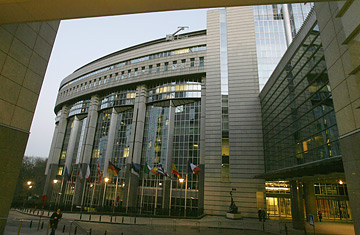
The European Parliament building in Brussels.
While the 785 members of the European Parliament rarely miss the opportunity to hammer home their democratic credentials, too often they find themselves ignored or mired in thanklessly complicated legislative procedure. But it can get worse: now the European Union's only directly elected institution is struggling to fend of accusations of widespread fraud among its members.
Last week details were published on the Internet of a secret report by the Parliament's own internal auditors that revealed a catalogue of scams used by some MEPs to pocket portions of their annual grant of $295,000 per member to hire office staff.
The report says that many parliamentarians have claimed expenses for family members or transferred funds to firms that seemed to have no purpose beyond receiving them. Although the report does not say how much of the 150 million-euro ($230 million) annual staff fund is abused, the allegations of fraud appear to extend to parliamentarians across the political spectrum and from all 27 E.U. member states.
The scandal has been exacerbated by parliamentary leaders' clumsy attempts to cover up the report. Even within the Parliament, only a handful of MEPs on the budgetary control committee were able to see the report — and they were obliged to read it in a guarded room, on condition that they took no notes and signed a pledge saying they would keep its contents secret. Although the Parliament's vice presidents agreed on Monday to review the system of hiring office assistants, they spent two weeks insisting the report was either non-existent or confidential.
The 92-page report was only made public when maverick Dutch Green Party MEP Paul van Buitenen broke the rules to put a summary on his website. Van Buitenen, whose whistle-blowing in 1999 helped bring down the entire European Commission, says the Parliament's top brass knew about the fraud for years but decided not to take any action to tighten the rules. "But so far, the Parliament has not been prepared to come forward with concrete proposals to improve the current system," he says. "The Parliament cannot claim to be the conscience of Europe while this is happening."
The report examines just 167 of 4,700 payments for staff during just one month, October 2004, and mentions no names. It says most MEPs channel the money to a third party, known as a service provider — usually accountants or a political party — who then should pay the staff.
But in this small sample, the report found MEPs paying money to their own bank accounts, to family members, to companies with no activity in their annual accounts, to service providers with irrelevant activities like the provision of child care and the trading of wood, and — in one case — a Christmas bonus worth 19 times the assistant's monthly salary. The auditors also refer to abuse of travel costs and expenses.
The EU's anti-fraud unit, OLAF, has already launched an investigation into the allegations. But since the Parliament's own guidelines on hiring staff are vague, and do not even require receipts for expense claims, MEPs can claim they have not broken any rules.
British Liberal Democrat MEP Chris Davies, who read the report under guard, said the actions of some of his colleagues had disgraced the Parliament. "Make no mistake, we are talking about very large sums of money," he says.
Davies wants offenders named and shamed, and the worst ones to be thrown in jail. But he says the Parliament shot itself in the foot by trying to keep the report secret. "It was utterly pathetic, naïve and hypocritical. You wonder what planet they grew up on," he says. "The European Parliament is doing good work. But in terms of recognition and acceptance by the wide European public, these incidents can only harm it. And that's a shame."
